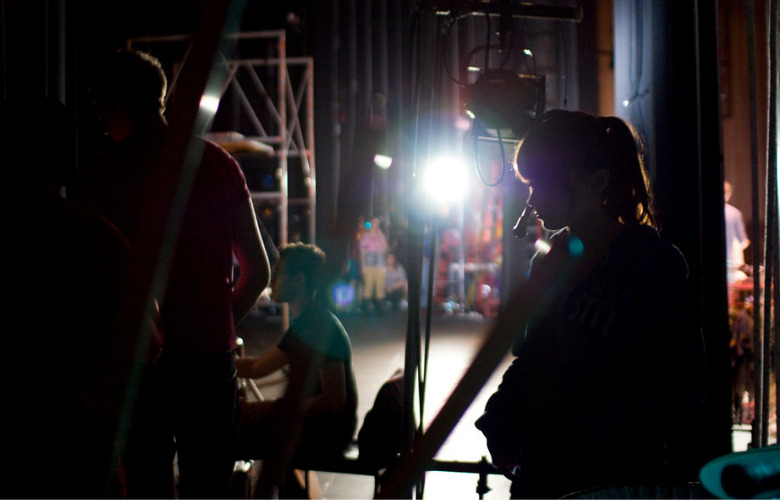
SMA is the Stage Managers’ Association. It is an organization based in the USA. However, its International Cohort is growing as well since it began in early 2019. A “UN of Stage Managers” with currently over 25 ambassadors from 15 countries on 6 continents. On July 5, 2021, SMA Director-at-Large David J. McGraw and Editor in Chief/International Cohort Chair Hope Rose Kelly from the USA met for an online discussion with SMA International Cohort Ambassador Anna Robb in Hong Kong. Together, they compared the work conditions of Stage Managers working in both regions and around the world. Drawing on their own experiences as stage manager as well as looking at a 2019 survey, their findings are profound and of imminent importance. We are sharing the highlights of their discussion in an article series of 4 parts. This is part 1.
In this first part, Dave and Anna focus on Dave’s 2019 SM Survey, on working internationally, different positions, systems, and work conditions.
Anna: In Hong Kong and the surrounding area there is a great difference between local SMs and expat SMs.
Some jobs are openly advertised, but most entertainment productions are locally led. Thus, for a foreigner to work, e.g., for the Hong Kong Ballet, Philharmonic Orchestra or other local productions is virtually impossible.
Also, the pay is local pay which is not sustainable for an expat. For an expat, who also may need to pay bills back home it is not a paycheck he or she can live on.
Expats need to work on the periphery. These are mostly international projects that come into the area, and jobs in the events industry.
For a survey in the Hong Kong region this means we would mostly tap into the expat network, not the local network.
Anna: In Hong Kong, there is a degree in stage management from the Hong Kong Academy for Performing Arts (HKAPA).
But, thus far, from what I’ve been told, there is no professional stage management degree in China. It is not really seen as an official position. People do it. It exists. But they just kind of end up falling into the role and doing it.
Dave: Positions are advertised. These are divided into union and non-union.
Looking at our 2019 US Survey, the root position is Stage Manager (SM). But there are also more Assistant Stage Managers (ASMs) than there used to be. Then, there are Production Stage Managers (PSMs) and General Stage Managers (GSMs). The GSM has arrived from Cirque du Soleil culture.
A new position that is becoming more and more frequent is the Production Assistant (PA).
It’s a temporary learning position with very low pay. However, people end up taking it to break into the market. And employers are beginning to exploit this willingness to give up a lot to find a break.
Dave: In the US there are two views of the Assistant Stage Manager position.
The first, growing, view is that it is a standalone position. It is its own area of responsibility and authority.
And, as such, a bit of a misnomer since you are not the assistant to the SM but rather a deck manager. Not calling but taking care of other backstage areas.
The second and older view is that the ASM is the assistant to the SM. In this case it is a learning position. This is still the case in some companies.
In some shows the ASMs never call the show. In other shows they do because there is an expected rotation.
Anna: No show is the same. The need for each show varies. Depending on genre as well. People evolve in in their positions, going from show to show, from ASM to SM.
Dave: This is one of my complaints against the US theatre system. It is not as logical in moving and progressing.
I have been on shows where positions weren’t opened based on need. Instead, they depended on preconditioned contract size. Which often is linked to the union.
Thus, you can end up with only one SM for an entire musical production but with an SM and two ASMs for a small play.
Anna: In every industry there are benefits and curses. The unions protect but can also be restrictive.
Here on the South East Asian side of the world, it is all a little bit more “Wild West.”
In your SMA Survey, we see as overall stage management responsibilities in the US: record blocking, be on book, line notes, prop tracking, rehearsal schedule, check attendance, record cues in tech, notes for performers, etc.
The last show I called in was a corporate event and I did maybe one of these things.
For an event, I’ll be a producer and stage manager. You must be diverse and dynamic in your skill set here in Asia. Same in Australia as well. You need to be flexible. Fill the gap which needs to be filled.
Anna: Going back to my training in Australia, yes, we did all this. But if anything, most of my commercial work is more than that.
The construct of what defines a SM has begun through the UK and US formulating what that role is. That’s where it’s built.
Over here in Asia, we are a bit “Wild West” because we’re kind of taking on whatever works best from everywhere.
We’re living in a different culture, working in different constructs. All of us trying to pull what we’ve learned in an institution far away. And applying it in the context of where we’re doing it.
Anna: That’s the challenge. While I worked in Australia, I didn’t have one. This starts to become a real problem when you get older and want to have a family.
My first full-time job was with Cirque du Soleil in Las Vegas. That was the first time I ever had a weekend in my working life.
Nowadays, I’ve established myself to a degree that I find there is no one checking anymore if I’m doing a good job or not. I must hold myself to that standard. And it gives me more freedom to organize my time.
I’ve been able to create this balance myself. But because I’ve been given the freedom to do so. Not because any overarching entity is saying, “We’re watching you and you need more time off.”
From what I have learned during discussions with SMs around the world for TheatreArtLife, most SMs in Africa, India, and the rest of Asia are very similar to our way of working here in Hong Kong, Macau, and China. Very different to the US and the UK.
Dave: Over the years I have adapted my life to the model I am working in within the USA.
I think we’ll see change as some people are willing to stay with the old, unhealthy ways, whilst others have new, higher expectations towards their working conditions.
Our survey in 2019 already showed that, over the years, SMs have become less and less satisfied with their work-life balance.
If you think about it, ten years ago we didn’t even use the term work-life balance. As our awareness has grown, people are expressing lower levels of satisfaction.
Anna: In Australia, if you say “no” because of pay or conditions there will be 10 other people who’ll be waiting behind you to take that job.
You must work like that for a certain time until they say, “No, we have to have you.” And once they say that you then get to say, “Ok, but then you need to pay me this amount.”
But that, of course, is a tough premise in its entirety, and hardly fair…
Official Website of the SMA Stage Managers Association.
The SMA International Cohort page.
Dave McGraw, Hope Rose Kelly, and Anna Robb are all experienced entertainment professionals.
Dave has enjoyed a varied career in Arts Entrepreneurship
and Stage Management. Since 2017, he has served as the Program
Coordinator for the thriving Arts Administration program
at Elon University.
Hope is an Equity Stage Manager based in the Berkshires.
She has worked at many companies in the Northeast and
across the Unites States.
Anna is Co-Founder and Managing Director for TheatreArtLife.
She is an experienced Producer/Production Stage Manager.
Her 20-year work history spans Asia Pacific, the Americas, Africa,
the Middle East and Europe.
Keep Your Cool Backstage as a Stage Manager: 12 Insights
Don’t Wear That Hat: Theatre Superstitions and Their Origins


Liam Klenk was born in Central Europe and has since lived on four continents. Liam has always been engaged in creative pursuits, ranging from photography and graphic design, to writing short stories and poetry, to working in theatre and shows. In 2016, Liam published his first book and memoir, 'Paralian'.
Read Full Profile© 2021 TheatreArtLife. All rights reserved.

Thank you so much for reading, but you have now reached your free article limit for this month.
Our contributors are currently writing more articles for you to enjoy.
To keep reading, all you have to do is become a subscriber and then you can read unlimited articles anytime.
Your investment will help us continue to ignite connections across the globe in live entertainment and build this community for industry professionals.